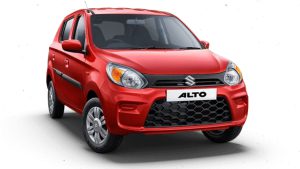With petrol prices across many states of the country sitting above Rs 100 per litre-mark, the sales of entry-level cars took a hit and customers are defer purchases of such models. Industry volumes have been low compared to the same period last year as we saw in February and is likely to follow the same trend delaying the revival of the industry,” according to Rajat Mahajan, partner, Deloitte India 
Oil marketing companies raised the prices of petrol and diesel after 137 days on March 22 by 80 paise per litre. Since then the rates have been hiked on six more days. The petrol and diesel prices have increased by almost Rs 4.85 per litre till March 29.
The car dealers in Western india, BigGaddi spoke to said that there might be some adverse impact on the sales of entry-level models due to rising petrol prices. However, they even added that some customers opt for CNG variants, in case they are available, to keep the ownership costs low.
The running cost for CNG vehicles is roughly one-third of that for petrol vehicles.
The combined sales of Maruti Suzuki India’s entry-level models like Alto and S-Presso have decreased by 2.60% to 196,271 units during the first 11 months of FY22. During the same period, the sales of Renault Kwid have declined by 34.41% to 24,074 units.
The Alto is priced between Rs 3.25 lakh and Rs 4.95 lakh (ex-showroom, Delhi), while the S-Presso is available in the range of Rs 3.85 lakh to Rs 5.56 lakh (ex-showroom, Delhi). The Kwid sits in the price bracket of Rs 4.49 lakh to Rs 5.83 lakh (ex-showroom, Delhi).
“Fuel price has been increasing gradually over the last few years, and we have seen rates crossing Rs 100 per litre in a few states earlier as well. The rates have again started rising after remaining stable for 3-4 months in the aftermath of the ongoing war in Europe. This will definitely act as a barrier, especially in the mind of a consumer who is planning to buy an entry-level car.
The overall sales in the country, including that of passenger vehicles, two-wheelers, three-wheelers and quadricycles, have fallen 6% to 15.18 million units during the April-February period of FY22.
“Any hike in fuel price directly affects the total cost of ownership (TCO) calculations of a prospective buyer adversely. If this situation of high fuel prices is prolonged, then the entry-level segment will see fewer inquiries and conversions; the long-term sales could be hit due to this,” said Suraj Ghosh, director, S&P Global.
“Nevertheless, making the purchase and taking delivery of a car is a big affair in a typical Indian family, especially so for the entry-level segment customers. So, there may not be cancellations of bookings or retraction of purchase decisions already made. So, in the immediate term, the impact may not be significant,” Ghosh added.
Events like fuel price hikes beyond Rs 100 per litre are still not a perceived normal. The only things that can contain this downward trend, to an extent, are the year-end discounts offered by OEMs/dealers which also look difficult given low stock levels across channels.
There is uncertainty over the timeframe till when the hike in fuel prices will persist and to what extent it will impact the buying patterns.While the temporary hike may not cause impact on demand, if extended it can defer purchase of vehicles.

 March 29, 2022
March 29, 2022 Blog Admin
Blog Admin



